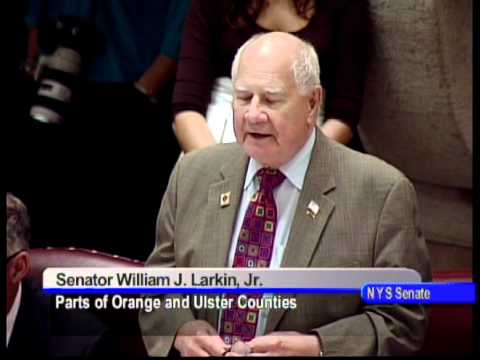
Larkin Announces 3-way Agreement On Budget Reform
William J. Larkin Jr.
January 15, 2007
Senator Bill Larkin (R-C, Cornwall-on-Hudson) today announced the Governor, Senate and Assembly have reached an agreement on Budget Reform.
"Two years ago the Senate passed 17 rules changes & reforms to open up the legislative process and make government run more efficiently," said Senator Larkin. "Today we approved additional rule changes that will further those efforts. While my colleagues and I in the Senate believe that more can still be done to improve legislative functions, the changes we are making today, with the support of the Governor and the Assembly, are a good starting point. We will continue our ongoing discuss our rules and procedures with the Minority as we work to make our procedures more open and accountable.
The Senate is adopting rules changes today that will:
> give all members more opportunity to debate bills -- new rule would change time for individual members to debate a bill from two hours to 30 minutes to give more members an opportunity to speak.
> open up the nomination review process by giving every member the opportunity to speak to a nominee appearing before a committee -- currently open only to members of the committee.
> allow for a greater number of bills to be discussed on the floor and in committee -- new rule allows for unlimited number of motions in a committee meeting to petition for a bill to be moved out of committee -- another new rule doubles the number of motions to bring a bill out of committee and to the floor from 1 to 2 per day; A motion on a bill can be brought in either committee or on the floor, but not both)
> Make it easier for the minority to propose amendments to legislation by reducing paperwork -- new rule eliminates notice of amendments to conference leaders, committee chairs and rankers.
> Accelerate process for bills to be sent to the Governor for a decision -- bill must be sent to Governor within 45 days of return from other house, unless sponsor requests a hold.
> Other rules changes would ban lobbyists from the floor; ban use of signs, placards & props in the chamber; and formally put in place procedures to eliminate empty seat voting.
A section breakdown of the bill includes the following:
Sections 1 & 2 define the term Journal Voucher and require the Comptroller to report annually to the Legislature on all activity during the prior fiscal year. Journal Transfer transactions generally include the interchange of funds between appropriations and are not currently subject to Legislative approval.
Section 3 requires the division of the budget to submit an estimate of the fiscal impact of the executive budget on local governments to the chairs of the senate finance and assembly ways and means committees and the comptroller.
Section 4 requires the Legislature to include the impact on local governments and the State workforce, along with General Fund spending projections for the current and subsequent fiscal years in its report on the enacted budget, which is already required by law.
Section 5 adds specificity to existing State Finance Law personnel reporting requirements to mandate that such reports be submitted by fund type. Also requires that actual and projected workforce levels resulting from Executive budget proposals be reported.
Section 6 changes the consensus economic and revenue forecasting conference to February and includes the comptroller. The comptroller would establish a revenue estimate which would be used only if the Legislature failed to reach an agreement by March 1.
Section 7 requires the Executive, Senate, and Assembly to begin discussions about revenue forecasts and spending projections for the current and upcoming fiscal years by November 5th each year. Subsequent review within six weeks following the end of the first quarter is required.
Sections 8 & 9 require the Executive to provide additional specificity in the three year financial plan projections of receipts and disbursements with the budget submission along with new reporting requirements for transfers and debt.
Section 10 amends section 22 of the State Finance Law to require the Executive to submit detailed reporting on technology related projects which are proposed to receive over $10 million in funding in the Executive Budget.
Sections 11, 12, and 13 require the Executive to provide additional specificity in the multi-year financial plan projections of receipts and disbursements with the budget submission along with new reporting requirements for transfers and debt.
Section 14 creates a new Rainy Day Reserve Fund, with a maximum deposit of three percent of the next fiscal years’ projected General Fund disbursements, and provides conditions under which the Executive may access the Fund, including economic downturn and catastrophic events.
Section 15 requires the Legislature to pass a concurrent resolution to establish joint budget conference committees within 10 days after submission of the Executive Budget.
Section 16 requires the Legislature to pass a budget that it determines to be balanced and to place a report on the budget to be enacted on the members desks prior to passage of bills.
Section 17 adds a requirement for estimates of fiscal impact to accompany any budget appropriation bill passed by the Legislature.
Section 18 defines "lump sum appropriations" as appropriations which fund more than one grantee by means other than a formula or competitive bidding.
Section 19 requires greater specificity in the Executive Budget for State Operations appropriations and more itemization in Medicaid, Temporary Assistance for Needy Families (TANF) and the Environmental Protection Fund (EPF).
Section 20 requires that if the Legislature adds a lump sum appropriation to the budget, no funds may be spent from that appropriation until a plan, either outlining a specific list of grantees or specific allocation methodology is approved by the Director of the Budget, the Finance Committee Chair and the Ways and Means Committee Chair, and a concurrent resolution outlining the list or methodology is passed by both houses.
Section 21 requires additional reporting on public authority debt and state supported debt.
Section 22 requires the Executive to make all practicable efforts to reduce the period during which he may amend the Executive Budget without Legislative approval from 30 days to 21 days.
Share this Article or Press Release
Newsroom
Go to Newsroom
Senate Passes Historic Property Tax Cap Legislation
June 27, 2011
LARKIN STILLBIRTH LEGISLATION PASSES SENATE
June 16, 2011

Larkin Stillbirth Legislation Passes Senate
June 16, 2011